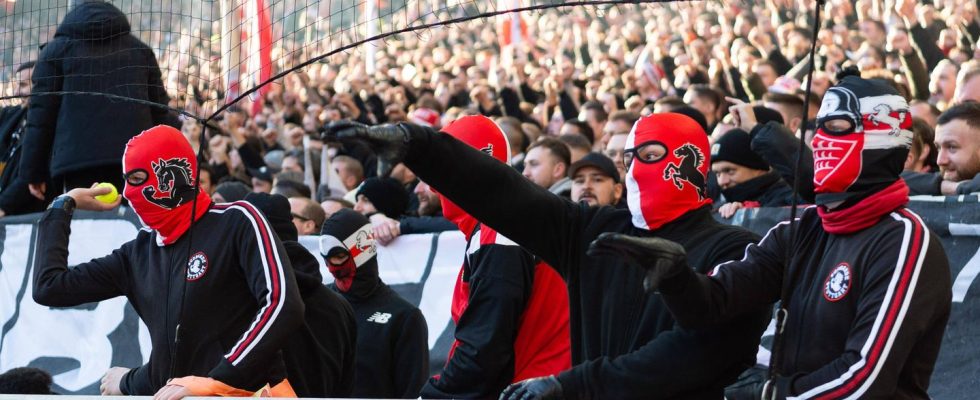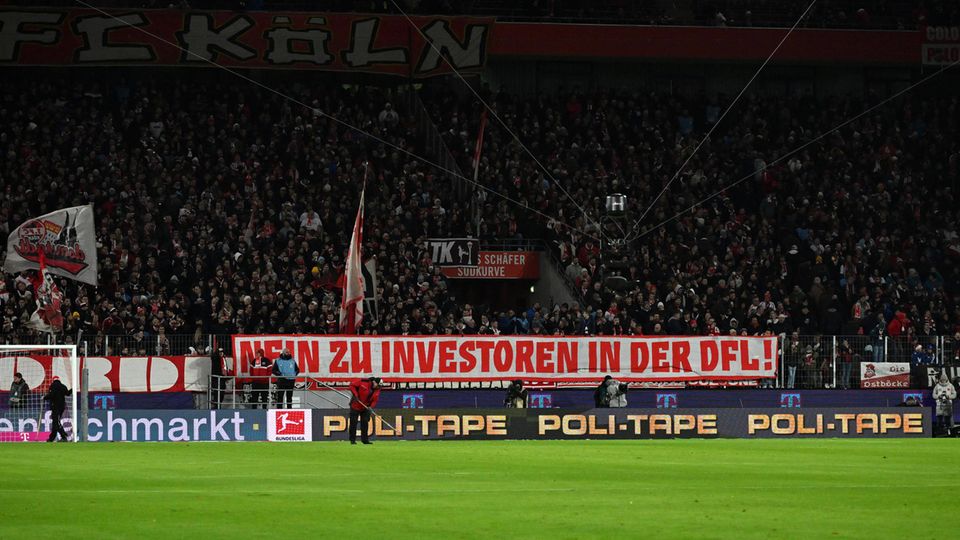The German Football League has made the fans an offer to talk in the dispute over the investor deal. But they refuse and will continue to disrupt games. The positions seem irreconcilable. It could be a tough fight.
Recently in Berlin: The game between the two big traditional clubs Hamburger SV and Hertha BSC in the Olympic Stadium had to be interrupted for more than 30 minutes. The reason was that the Hertha Ultras from the east curve started throwing tennis balls onto the grass shortly after the restart. Referee Daniel Schlager was forced to interrupt the game. The Berlin supporters are said to have cleverly brought slingshots with them in order to overcome the considerable distance. In the good old Olympic Stadium there is still a classic tartan track between the stands and the playing field.
Balls kept flying. The stewards couldn’t keep up with collecting the yellow felt balls. In the meantime, Hertha coach Pal Dardei went to the supporters to stop them from throwing any more shots. It’s all of no use. No game was possible for half an hour. At one point, the other spectators in the stadium were so annoyed that they whistled loudly.
The fans probably won’t give up so quickly
Fans have been protesting in this way for weeks – either using chocolate coins or lemons – against the German Football League’s investor deal. Most recently, the catch-up game in the Bundesliga between Mainz 05 and Union Berlin was affected. But Berlin represented a high point or a low point, depending on which perspective you take.
The fans probably won’t give up their protest so quickly. The fronts have hardened on both sides; it is about the fundamental question of the extent to which investors are allowed in German football. In December, the DFL had the 36 professional clubs in the 1st and 2nd Bundesliga vote on whether they could sell part of their media rights to financial investors. The result was extremely close: the required two-thirds majority of 24 yes votes was barely achieved.
The deal stipulates that the DFL sells six to eight percent of its media rights, which it outsources to a subsidiary, for up to one billion euros (ideally) over a period of 20 years. There are still two potential donors in the running.
Ever since plans were announced, fans have been taking to the barricades
So far, so bad for the organized fan scene. Since the plans became known, supporters have been resisting the entry plans. They fear that a donor will have an influence on German football, for example in the organization of match days (even more different kick-off times) or in outsourcing games abroad. There is criticism that the two remaining bidders, private equity firms CVC Capital Partners and Blackstone, are receiving money from Saudi Arabia, which fans consider to be a “dirty” investment. “CVC & Blackstone – there’s blood on your hands,” read a banner in the Stuttgart fan curve.
Conflicts of interest are also feared. CVC holds shares in the French and Spanish leagues as well as 60 percent shares in the sports betting provider Tipico, which in turn is a sponsor of the DFL and FC Bayern. Blackstone has a manager, David Blitzer, who holds shares in Bundesliga club FC Augsburg through a subsidiary, as “Sportschau” reports. The DFL, on the other hand, assures like a mantra that it has contractual protection against such influence. In the future, game day organization should continue to be the sole responsibility of the DFL.
But what happens if investors want to sell their shares again? In this case, the deal stipulates that this can only happen after eight years at the earliest, says the DFL. If there are critical bidders from Saudi Arabia or China in such a case, the DFL has the right to veto. She can also buy the shares back after nine or 15 years. What you have to give the DFL credit for is that it has already responded to criticism from the clubs. The deal originally had a larger volume. The plan was to sell off 12.5 percent of the media rights for around two billion. But the clubs rejected this because they found it too risky. And because the smaller clubs found the distribution of the money unfair. The DFL then slimmed down the package and put it to the vote again.
German football urgently needs investors
What further fueled the conflict: The narrow result of 24 yes votes came about because the representative of Hannover 96, the controversial entrepreneur Martin Kind, agreed – in contrast to his mandate. That means: The club had instructed Kind, managing director of the outsourced professional department, to vote no, but he didn’t stick to it. Fans see this as a violation of the spirit of the 50+1 rule. This means that the association always retains the majority in the outsourced corporation.
Clubs like VfB Stuttgart, Union Berlin and some others are therefore calling for the vote to be repeated, openly and not secretly. You have to react to the protests and you can’t push the deal through bypassing the fans. More transparency is needed to give investors more legitimacy.
It is doubtful whether a second vote, which is again positive, will appease the fans. The fans are also calling for a second vote because they seem certain that the deal would be rejected this time. They seem to have only one goal: they want to completely prevent international investors from joining the DFL. And the power of followers is great. The events in Berlin have proven that they can cause significant disruptions up to and including the abandonment of the game.
Fans of 1. FC Cologne protest against the entry of an investor into the DFL during the home game against Bayern Munich
© Team2 / Imago Images
DFL: What happens without an investor deal? That’s open
The critics do not say what consequences a rejection of the deal would have. Nor how money can be generated in other ways. The clubs rejected the model of a loan-financed cash injection right at the beginning of the debate. There is a broad consensus among the clubs that German football needs a strong financial injection if they do not want to be left behind by the Spanish or especially the English Premier League. To achieve this, foreign marketing is to be strengthened; the DFL wants to invest in digital platforms and streaming offerings, from which all clubs will benefit.
The DFL recently made a very late offer of talks to fan representatives. But the attempt to seek dialogue failed miserably, as expected. The fans politely declined the invitation and in turn intensified their criticism. So everything is heading towards a power struggle, fought out in the stadiums and at the expense of football. Secretly, the deal supporters among the clubs and the DFL are betting that the strict anti-attitude does not have a majority among the supporters and that most of the other supporters in the stadium will at some point be annoyed by the protest actions. Remember the whistles in Berlin.
The question remains whether this is actually the case. It was a fallacy to believe that only a fraction of fans would take a position against the planned investor deal, they said threateningly. The battle is far from over.
Sources: DPA,”Southgerman newspaper“, “Our curve“, “Frankfurter Rundschau“, “Sports show“, “Eurospsort“


